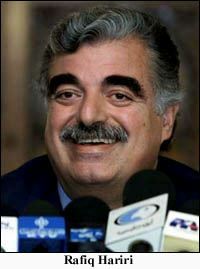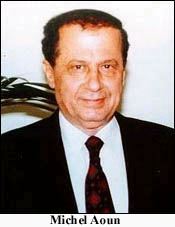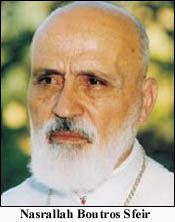 |
| Vol. 3 No. 9 | Table of Contents MEIB Main Page | September 2001 |
 |
To be sure, the crisis revealed that a substantial erosion of civil liberties and continued constitutional violations by President Lahoud and the military-intelligence complex threaten to seriously undermine the country's economic recovery. According to a report released by Lebanon's Central Bank, the country's hard currency reserves fell by more than $600 million last month. "This was the cost of the recent political storm," said the Lebanese daily Al-Nahar.1
However, rather than checking the power of the military-intelligence complex, the economic fallout of the crisis has served to strengthen it by demonstrating that Lahoud has the power to disrupt Hariri's efforts to bring the country out of recession. "Disputes among the top leaders cause heavy losses that surpass them as persons and hit at the homeland and the economy," Lahoud said during a speech earlier this month.2 Hariri and his allies in the government understood all too well the blackmail implicit in this statement.
The Lahoud camp was also strengthened by the relatively muted international response to the crackdown. During the course of last month's crisis, several members of the European Union pressed the body to release an official statement threatening to reject Lebanon's entrance into an economic partnership with the EU unless the country ends rampant extrajudicial human rights abuses against political dissidents. According to European diplomatic sources, however, the French government lobbied intensively against such a statement. In the end, the EU decided only to send a delegation to Lebanon to "inquire" about recent developments. Although French officials offered mild criticism of the arrest sweep (Foreign Minister Hubert Vedrine called it a "bad method"), they went to great lengths to assure Lebanon (and, by extension, Syria) that the crackdown would not affect economic ties.
Lahoud's increased political capital was evident in the resumption of periodic arrests and intimidation by the security forces after a brief lull, particularly against the Lebanese Forces (LF), whose alleged contacts with Israel have been the target of a major investigation [see An Israeli-LF Plot? in the August issue of MEIB]. On September 5, military intelligence officers arrested LF officials Saud Shebl and Fadi Shamati, who were allegedly planning rallies for the following week. On September 14, security forces disrupted a memorial service commemorating the late President-elect Bashir Gemayel, arresting four LF activists and briefly detaining dozens more. Three senior LF officials arrested last month, Toufic Hindi, Salman Samaha and Elie Keyrouz, remain in detention.
 |
Ominous signs of a renewed assault on the press have also been evident since the crisis. Late last month, prosecutors charged Joseph Nasr, an editor for the country's leading newspaper, Al-Nahar, and political commentator Rafi Madayan with "slandering the army and harming its reputation." The charges referred to an August 9 article in Al-Nahar, written by Madayan and approved by Nasr, which described the army's mistreatment of recruits during training.4 Days earlier, the military filed a defamation suit against Al-Watan Al-Arabi, a Lebanese magazine based in Paris which reported last month that Syrian officers had taken command of some Lebanese army units and that thousands of Syrian soldiers were serving in Lebanese army uniforms.
On August 30, the Lebanese business magazine Executive published a blank issue in protest against the regime's assault on public freedoms. On the inside cover, the magazine printed in large type a quote from the late American President John F. Kennedy: "We shall pay any price, bear any burden, meet any hardship, support any friend, oppose any foe to assure the survival and the success of liberty."
Earlier this month, the authorities even threatened to prosecute Lebanese living abroad for their exercise of free speech. On September 21, the Washington Times ran a quarter-page advertisement by the pro-Aoun Council of Lebanese American Organizations (CLAO), warning President George W. Bush that "he should not be assured by the deceitful pledges of cooperation" with the American anti-terrorism campaign from Lebanon, which "continues to support and harbor terrorism." Parliament Speaker Nabih Berri denounced "those trying to slander Lebanon abroad," while Prosecutor-General Adnan Addoum ordered an investigation into this act of "treason" and pledged to expose and punish those responsible for it.
Meanwhile, the regime managed to contain and reverse a highly embarrassing surprise in the judicial system. In two separate rulings on September 3 and 5, Lebanon's Court of Cassation ruled that the military courts did not have the jurisdiction to try 77 anti-Syrian activists arrested by security forces last month. The court's ruling, which under Lebanese law cannot be appealed, abruptly halted legal procedures initiated by the tribunal and mandated that the defendants be referred to civil courts, except for those accused of "harming the reputation of the Lebanese and Syrian armies and those accused of committing violence on security agents." The court's decision, while largely insignificant with regard to the fate of the detainees (most of whom had been released on bail and faced brief prison sentences or fines), was nevertheless hailed in the Lebanese media as an unprecedented blow against the power of the military courts and their jurisdiction over cases involving criticism of Syria.
However, Chief Military Prosecutor Nasri Lahoud promptly filed an appeal before the Supreme Court, asking that the ruling be nullified, arguing that lawyers for the defendants had challenged the military court's decisions after the legal deadline of 24 had passed. This prompted the head of the court of cassation, Judge Ralph Riachi, to resign on from both this post and the judiciary altogether in protest against what he called an "illegal appeal."
The resignation of Riachi, who serves on the UN War Crimes tribunal at The Hague and is widely respected in Lebanon, was lamented both by opposition figures, who regard him as one of the few relatively independent voices in the judiciary, and by government officials, who saw his resignation as an embarrassing protest against Syrian influence over the courts. Pressured from all sides to retract his resignation, Riachi did so, but the judicial dispute remains unresolved.
Christian Solidarity Unshaken
 |
Initially, the plan seemed to work. When Aoun criticized Maronite Christian Patriarch Nasrallah Boutros Sfeir and the Qornet Shehwan Gathering of mainstream Christian politicians for their reluctance to unequivocally challenge the Lebanese regime and Syria, Christian political elites reacted in virtual unison by condemning his statements. However, given the magnitude of abuses by the security forces last month, the Patriarch apparently decided that he could not appear less strident than Aoun in calling for freedom and sovereignty in Lebanon. The fact that Druze leader Walid Jumblatt (though not his allies in the cabinet) continued to berate the security establishment after the "resolution" of the crisis, along with a handful of other Muslim political figures, further undermined Sfeir's willingness to soften his stance toward the regime.
On September 5, the Council of Maronite Bishops released a statement criticizing the Syrian presence in Lebanon and calling for the restoration of Lebanese sovereignty. Noting that a similar appeal had been issued just under one year ago, the statement said, "we have waited for a year, during which we saw in the political arena only a few timid attempts that quickly evaporated, leaving the Lebanese perplexed by the ambiguity shrouding the relationship with Syria."
The statement criticized Lebanese political elites who have said that the Syrian military should remain in Lebanon until a settlement of the Israeli-Palestinian conflict is concluded. "Who knows when that conflict, which has persisted for half a century, will end? There are no indications of a solution in the foreseeable future."
"The Syrian army's continued stay in Lebanon will entail a grip on politics by [security] agencies, preventing the exercise of democracy and dealing a fatal blow to public liberties," said the statement. "The only solution to this abnormal situation is to enable Lebanon to shoulder its own responsibilities and allow it to put its own house in order, while maintaining coordination with Syria on mutual issues." Unlike last year's statement, it did not make reference to Lebanon's "special" relations with Syria, calling instead for "coordination" and "fraternity" between the two countries.
The statement concluded by calling on "all citizens, no matter what their affiliations, to strengthen confidence in themselves and the country and to close ranks in fraternal unity to restore to Lebanon the status in the international league of free, sovereign and independent states.5
Notes
1 Al-Nahar (Beirut), 4 September 2001.
2 Al-Nahar (Beirut), 4 September 2001.
3 The Daily Star (Beirut), 11 August 2001.
4 Al-Nahar (Beirut), 31 August 2001.
5 The Daily Star (Beirut), 6 September 2001.